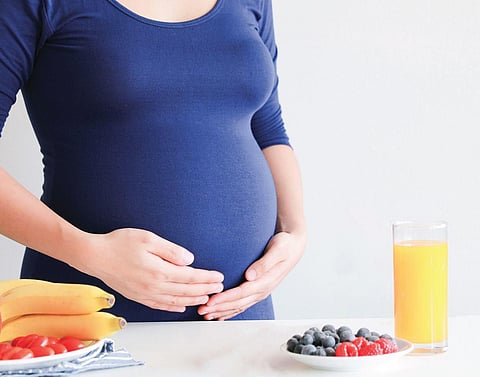

CHENNAI: During pregnancy, the baby gets all important nutrients from the mother and that’s why mothers need more than what they did before pregnancy. This ensures that both are getting enough nutrients and energy needed to support the optimal growth and development of the baby as well as a healthy pregnancy.
All nutrients are important for mothers-to-be but folic acid, iron, vitamin D, calcium, iodine, and DHA are particularly critical. Of these, DHA is something that is not usually found in all regular prenatal vitamins and that’s why many women have questions related to the importance of DHA during pregnancy. So, why should mothers-to-be know about it?
What is DHA?
DHA or docosahexaenoic acid is a type of essential omega-3 fatty acid that is not synthesized by our body and must be obtained through a diet including fatty fish such as salmon, tuna, anchovies or through supplementation.
Your baby’s brain develops rapidly especially during the last trimester of your pregnancy till the first two years of the baby’s life. DHA, an essential health booster, amounts to 97% of the omega-3 fatty acid found in the brain and 25% of the brain’s total fat content. Since DHA is significantly present in the brain and retina, it helps support the baby’s brain and eye development as well as the central nervous system. It’s not just important for babies but mothers too. Sufficient levels of DHA can ensure a full-term pregnancy. When taken in the right amount, DHA has been shown to reduce the risk of preterm labour and preeclampsia and also ensures a healthy birth weight of the baby. Moreover, DHA can support a mother’s mood after delivery.
How much DHA is needed?
During pregnancy, mothers-to-be need at least 200 mg of DHA. However, since DHA is primarily found in fatty fish, pregnant women who follow a vegetarian diet are particularly found to be DHA-deficient. Therefore, it is important that you know your DHA levels and change your diet or add supplements based on the results. You can choose an at-home blood test to help you quantify and monitor your DHA levels without stepping out during this pandemic.
DHA and Breastfeeding
DHA is naturally present in breastmilk and supports your baby’s cognitive function and vision. The recommended amount of DHA for breastfed infants is 0.32% to 0.35% of milk fat. However, the consumption of DHA by breastfeeding mothers and its levels can be difficult to quantify because of its varied quantities in food and the different absorption patterns. Therefore, an in-depth analysis of breast milk to test your DHA levels ensures that your baby is getting the right nutrition for a health boost.
How to ensure adequate DHA levels?
Based on your test results, you can implement dietary modifications or supplementation after talking with your doctor or dietitian.
Now, with the right and convenient at-home diagnostic tools, you can know your blood and breastmilk DHA levels during pregnancy or lactation to modify your diet and supplementation to ensure the optimal development of your baby.
(The author is Neonatologist/Pediatrician, Max Healthcare, Punjab)